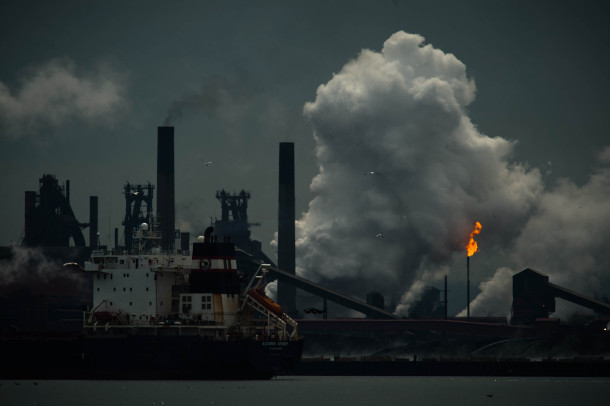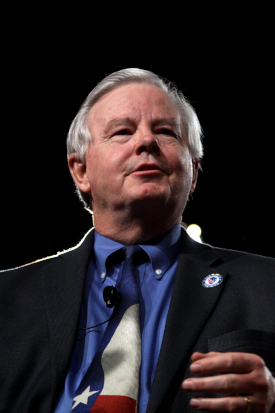Beyond the Headlines
Air Date: Week of June 12, 2020

Hamilton Harbor’s toxic blob is 6 blocks long, and the result of over 150 years of pollution. (Photo: Mark Ziubinski, Wikimedia Commons, CC BY 2.0)
In this week’s trip beyond the headlines, Environmental Health News Editor Peter Dykstra updates Host Steve Curwood on a new executive order that would allow fossil fuel companies building pipelines to bypass key environmental regulations, as part of “emergency” measures to boost the economy. Peter and Steve also discuss plans to seal off a huge toxic “blob” in Lake Ontario, and the tenth anniversary of the political fallout from the 2010 Deepwater Horizon Spill.
Transcript
CURWOOD: It's time now for us to take a look beyond the headlines with Peter Dykstra. Peter's an editor with environmental health news, that's ehn.org and dailyclimate.org. With us now from Atlanta, Georgia, Peter, Hey, what's going on?
DYKSTRA: Hi, Steve. You know, if you're the Trump administration, what better time to sneak in some of the biggest rollbacks of environmental laws and regulations, then when the country and the world are consumed with two massive stories, the COVID pandemic and of course the police brutality behind George Floyd's murder and so many other cases.
CURWOOD: Not to mention the economic meltdown or whatever we call it. I think they labeled it a recession the other day.
DYKSTRA: Yeah, let's hope things only come in threes. But what has happened much more quietly, is that there are potential violations of the Clean Air Act, the Clean Water Act, the National Environmental Policy Act, Endangered Species Act, other laws and regulations that could be ignored according to a new Trump executive order in what he calls emergency measures involving the oil and gas industry, and the coal industry as well as other projects, particularly pipeline construction.
CURWOOD: Hmm. I understand there's a climate emergency, Peter, but I don't figure how this order helps that.
DYKSTRA: No, it's not going to help it at all. This is something that will certainly be contested in court by environmentalists and other affected parties. There's an element of environmental racism in the background here, because as with many pollution issues, minority communities could also be disproportionately affected by Trump's executive order.
CURWOOD: So the President has been getting out and about with his orders, he just was recently in Maine. What did he bring to help his campaign there?
DYKSTRA: Well, he's reeled in another big one in terms of environmental rollbacks, a marine monument, a Protected Area off the coast of Maine, instead of being off limits for commercial fishing will now be inviting commercial fishermen in if litigation doesn't stop the newest roll back from Trump.
CURWOOD: Hey, what else do you have for us today?
DYKSTRA: A story about thick, black toxic, 150 year old blob in Lake Ontario in Hamilton Harbor, Hamilton an industrial city on the Canadian side of Lake Ontario. And in that Harbor, there's a blob that stretches about six blocks. It started in the 1870s with coal tar waste from a coal facility. Other polluting industries have added to it since, they've known about it for 30 years, but they have no idea how to deal with it. You can't just start to dig up a blob without releasing its pollution elsewhere and maybe making things worse for things like the drinking water supply for Canada's biggest city Toronto. So they've decided to build a box around the Hamilton blob for a potential multimillion dollar solution.

Gas from the damaged Deepwater Horizon oil well is burned by the drillship Discoverer Enterprise, May 16, 2010 in a process known as flaring. (Photo: Petty Officer 3rd Class Patrick Kelley, DVIDSHUB, Flickr, CC by 2.0)
CURWOOD: The blob box huh?
DYKSTRA: They're not quite sure if it's gonna work, but over 30 years of agonizing of how to deal with this major pollution problem, they're thinking it's worth a try.
CURWOOD: Okay, and tell me what you see in terms of history today, Peter?

Congressman Joe Barton of Texas demanded that Former President Barack Obama apologize to British Petroleum for the more than 20 billion dollars in fines that his administration levied against them to pay for cleanup costs from the Deepwater Horizon spill. Obama never caved to these demands. (Photo: Gage Skidmore, Wikimedia Commons, CC by S.A. 2.0)
DYKSTRA: Well, it's a 10th anniversary for June 13 2010, nearly two months after the Deepwater Horizon spill, it was still flowing and Representative Joe Barton demanded an apology, not from British Petroleum but to British Petroleum, from President Obama, for conducting what Barton said, was a shakedown in cleanup costs. BP had agreed to pay at that point 20 billion to the administration for cleanup costs.
CURWOOD: But of course, a little while later, the numbers started to come out.
DYKSTRA: The numbers started to come out, the spill was quite a bit higher. It took a lot more than two months to even cap the spill. Its impacts are still uncertain. And the congressman known as Smokey Joe Barton left office in the last election cycle. President Obama never backed down from trying to get BP to pay up.
CURWOOD: Thank you. Peter. Peter Dykstra's an editor with environmental health news that's ehn.org and dailyclimate.org. We will talk to you again real soon.
DYKSTRA: All right, Steve, thanks a lot. Talk to you soon.
CURWOOD: And there's more on these stories at the Living on Earth website. That's L-O-E.org
Links
The Hill | “Trump Signs Order Removing Environmental Review for Major Projects”
Living on Earth wants to hear from you!
Living on Earth
62 Calef Highway, Suite 212
Lee, NH 03861
Telephone: 617-287-4121
E-mail: comments@loe.org
Newsletter [Click here]
Donate to Living on Earth!
Living on Earth is an independent media program and relies entirely on contributions from listeners and institutions supporting public service. Please donate now to preserve an independent environmental voice.
NewsletterLiving on Earth offers a weekly delivery of the show's rundown to your mailbox. Sign up for our newsletter today!
 Sailors For The Sea: Be the change you want to sea.
Sailors For The Sea: Be the change you want to sea.
 The Grantham Foundation for the Protection of the Environment: Committed to protecting and improving the health of the global environment.
The Grantham Foundation for the Protection of the Environment: Committed to protecting and improving the health of the global environment.
 Contribute to Living on Earth and receive, as our gift to you, an archival print of one of Mark Seth Lender's extraordinary wildlife photographs. Follow the link to see Mark's current collection of photographs.
Contribute to Living on Earth and receive, as our gift to you, an archival print of one of Mark Seth Lender's extraordinary wildlife photographs. Follow the link to see Mark's current collection of photographs.
 Buy a signed copy of Mark Seth Lender's book Smeagull the Seagull & support Living on Earth
Buy a signed copy of Mark Seth Lender's book Smeagull the Seagull & support Living on Earth

